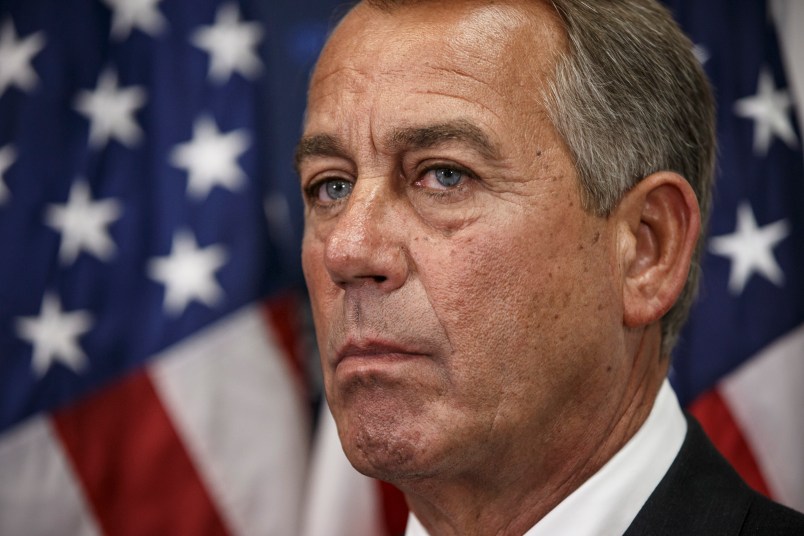It is looking more and more likely that Speaker John Boehner will stiff House conservatives and push through an increase in the debt limit with the help of Democratic votes before he steps down. It would be a fitting parting shot to end his speakership.
If the last few years of budget brinkmanship and debt ceiling showdowns were theater, then a standalone, drama-free debt ceiling vote arranged by Boehner on his way out would be the play’s denouement. It was Boehner after all, who starting in 2011, escalated the strategy of using debt ceiling votes to seek concessions on spending from Democrats.
GOP sources are telling reporters privately that Republican leadership has conceded that a debt ceiling hike will probably need to advanced on its own ahead of a Nov. 5 deadline, separate from the budget negotiations underway ahead of the government spending deadline Dec. 11. Publicly, Boehner’s aides are, at the very least, not knocking down reports there will be a “clean” debt ceiling vote and anticipating that he will “solve some outstanding issues” such as a debt limit hike.
Lawmakers may argue whether the tactic was ever really successful; the Obama administration has signaled that it feels negotiating around the debt ceiling in 2011 was a major mistake. It also fueled a House GOP conference who came to view a game of chicken over the nation’s credit rating to be the norm: “I prefer to think about it as opportunities and pinch points,” Rep. Tom Price (R-GA) told reporters last December.
Many of those lawmakers, after essentially forcing Boehner out under threat of a coup or a government shutdown, are now making life difficult for anyone who tries to replace him. A clean debt ceiling vote would be rebuke to them, if not a recognition that the approach was never very smart in the first place.
“There’s never been a meaningful success in using this strategy, it’s the legislative equivalent of banging their head against the wall repeatedly,” said Jim Dyer, a former appropriations staff director and now a Republican strategist at the Podesta Group.
The White House and congressional Democrats have presented a united front in demanding a clean debt ceiling vote. “That’s not a negotiable provision. That is a requirement and that’s our expectation … that that is what the Congress should do,” spokesman Josh Earnest said Wednesday. “I would point out that, thanks in part to Boehner’s leadership, that is actually what Congress has done the last few times.”
But some in the Republican conference have held tight to the tactics of the 2011 showdown that brought spending caps, even after the episode led to the a downgrade of the U.S.’s credit rating. Time and time again since, GOP leaders have vowed to demand spending cuts ahead of a debt limit vote, only to back down, when push came to shove.
“There is no plan under John Boehner,” Rep. Tim Huelskamp (R-KS), a leader of the House GOP’s conservative, griped to The Hill this week. “They have no plan until the last minute and force it down the throats of the American people.”
Boehner’s pending retirement undoubtably defuses concerns of a possible blowback from within his caucus. Moving on the issue before the speaker’s election means its one less thing Boehner’s successor will have to make promises on in exchange for conservatives’ support.
“Speaker Boehner is probably as free as he ever is going to be to follow this approach,” Bill Hoagland, senior vice president at the Bipartisan Policy Center. There’s also the landscape for the 2016 race to consider, with not just the presidency on the line, but swing seats in the Senate that Republicans need to hold to maintain control.
“The last thing they want to make it look like is that Republicans can’t govern and defaulting on our obligation for the first time in history would be a major setback for Republicans,” Hoagland said.
For Boehner to abandon the politics of budget brinkmanship on his way out the door is ironic both because of how the rolling series of crises defined his speakership and because in the end it got him nowhere.
“It would seem to me that we’re finally getting to a point of recognizing that this whole exercise, year after year, has been part of the effort that has made Congress look so inept because we are grappling with something we can’t grapple with,” Dyer said. “This business of jeopardizing the full faith and credit for the United States over a political statement that you literally don’t know how to make just doesn’t make any sense to me.”







Good lord, these people do have an obsession with things being “forced down their throats”, don’t they?
It seems the republicans in Congress, at least the forty or so “Traitors of this Nation” have won…Why? because the Gop Has had weak kneed and “alcohol stewed decisions” by the Boehner…This is what is making the USofA look weak and sad in the “Eyes Of the World”…Especially Putin…
This isn’t about Boehner. It’s not even really about the debt ceiling. It’s about whether one party wants to govern or just rant and scream.
The very idea of a debt limit is a another Republican gimmick that serves no legitimate purpose. We would not need a debt limit if they would just raise corporate and excise taxes because as Clinton proved, even a small tax hike can produce a surplus that can then lower the debt instead of pretending you are a fiscal conservative.
Hey Congress,
You want to save money?
Will this be hard, yes. But it’s the 21st century.